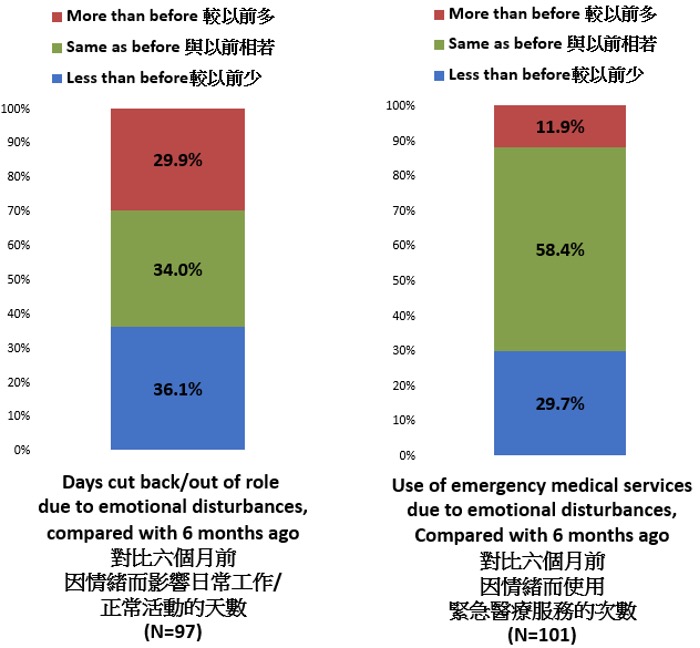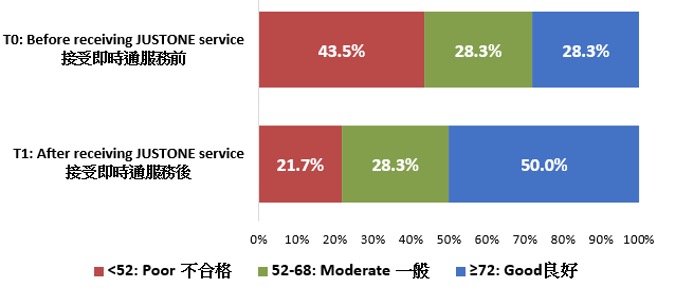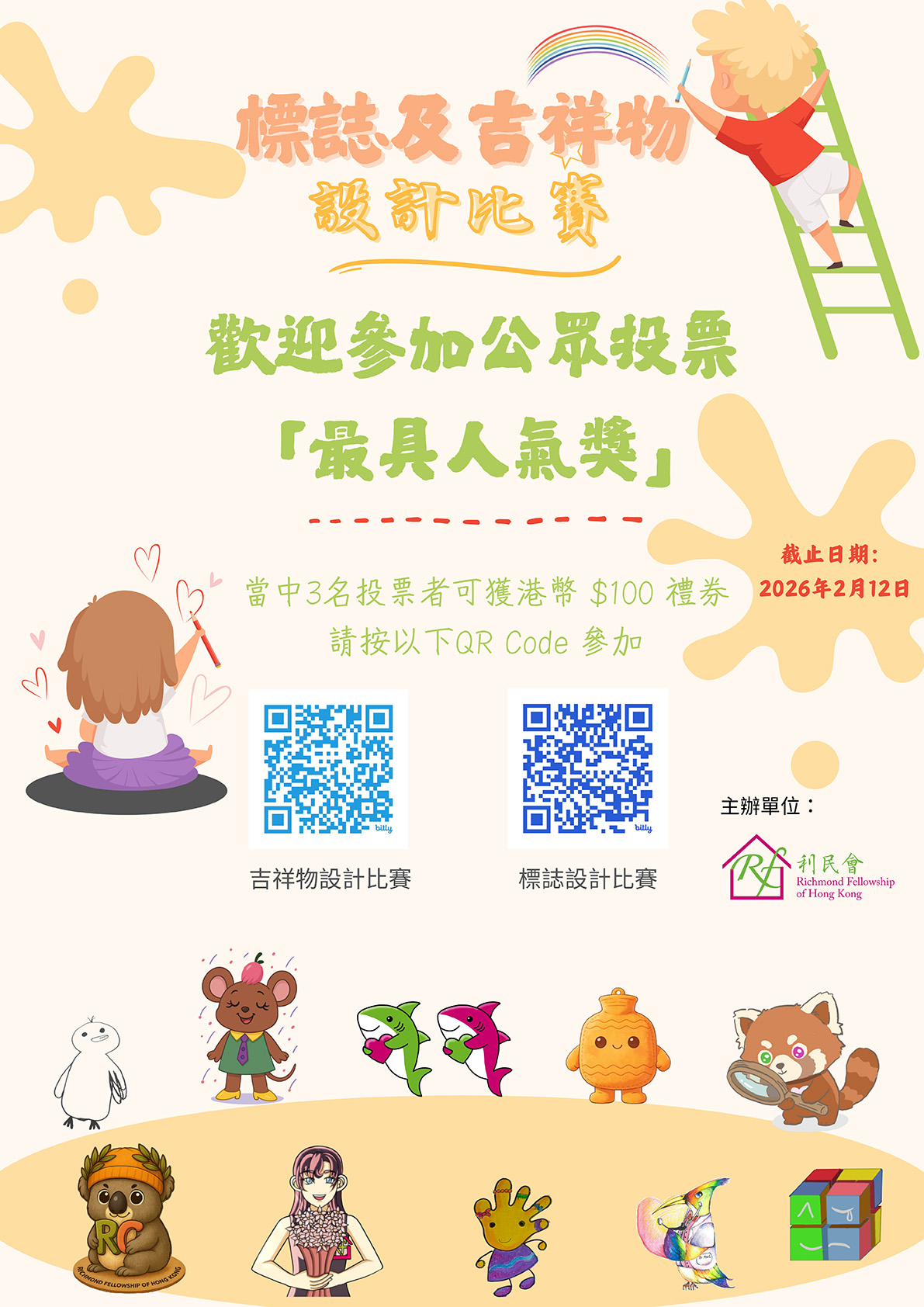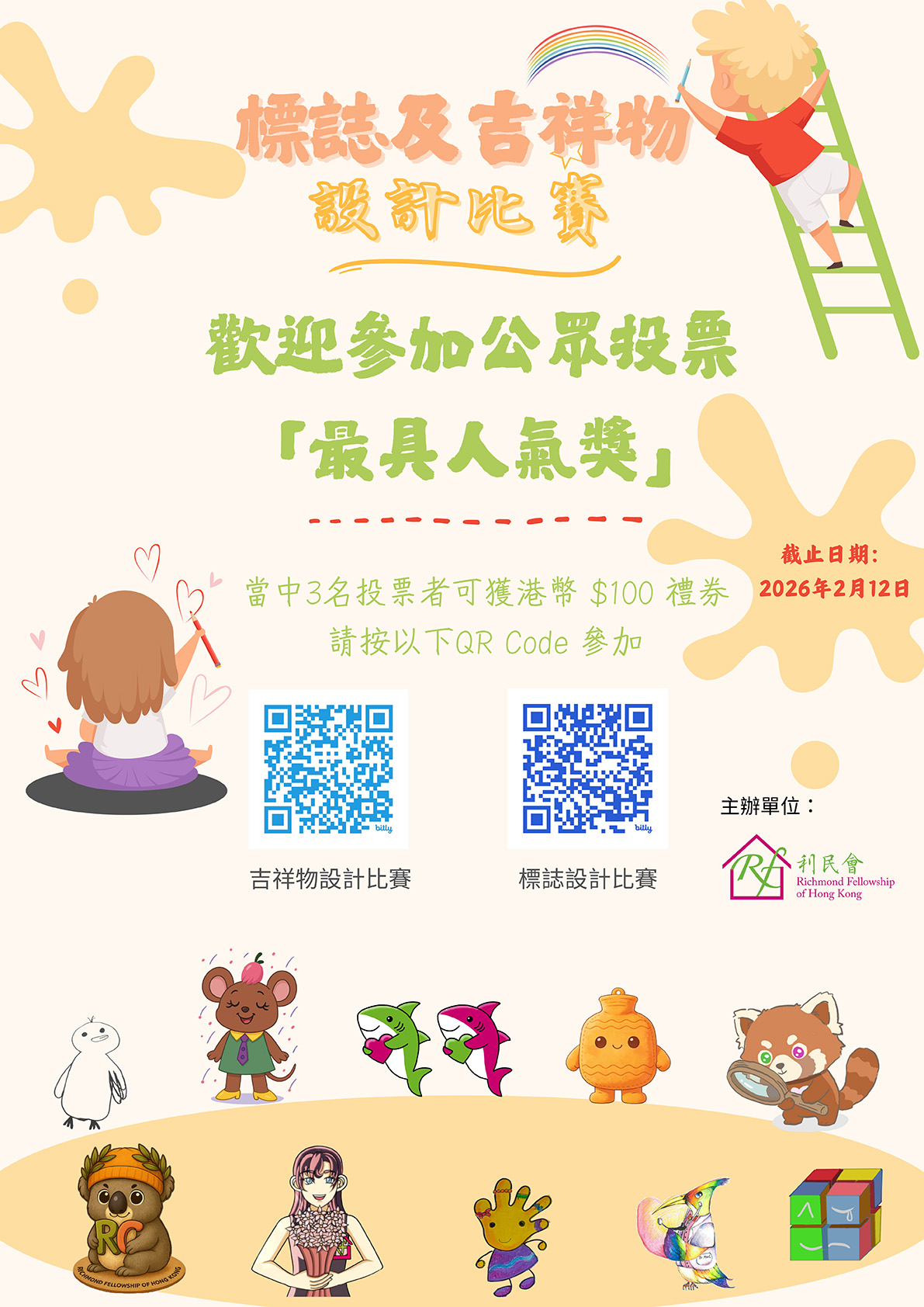《即時通》24小時精神健康守護同行計劃:服務使用者的問卷調查和焦點小組討論
背景及簡介
《即時通》24小時精神健康守護同行計劃由利希慎基金、周大福慈善基金及嘉里集團贊助,以一站式精神健康支援平台為大眾、會員和照顧者提供熱線服務以及線上諮詢和培訓。另外,亦對會員進行定期跟進和評估,以建立支持性融洽關係、資源網絡並防止舊病復發。
研究時期
2021年2月- 2022年10月
目標人群
正接受《即時通》服務的會員(熱線來電者)
目的
- 透過問卷調查評估《即時通》服務在會員生產力和精神健康方面的成效
- 透過與會員進行焦點小組訪談收集意見和建議,研究如何進一步改善和擴展《即時通》的服務
方法
會員在完成第一次熱線服務後以及接受服務6個月後,會被邀請自行填寫一份線上問卷或由受過培訓的同工進行問卷訪問。問卷包括生產力和緊急醫療服務的使用(Kessler et al, 2002)以及精神健康(Topp et al, 2015)的評估。亦透過現場和線上進行焦點小組訪談,收集會員對服務的體驗、對服務的看法(包括:優勝之處和需要改善的地方),以及接受服務後對情緒管理、與家人和朋友關係等的影響。
結果
問卷調查
- 分別有101 名和46 名《即時通》會員完成了凱斯勒心理困擾量表(Kessler 6)和世界衛生組織五項身心健康指標(WHO-5)。
- 接受《即時通》服務六個月後:
- 36.1%的受訪會員的日常工作或正常活動,因情緒因素而受到影響的日數減少了(圖1)。
- 29.7%的會員減少了因情緒問題而使用緊急醫療服務(圖1)。
- 身心健康指標的平均分數由 50.52(不合格)顯著提升至 68.00(一般)(p < 0.001)。
- 第一次接受服務時有28.3%的受訪者被評為身心健康良好,六個月後上升至50%(圖2)。
圖 1. 接受服務6個月後生產力和緊急醫療服務使用因情緒困擾而導致的變化

圖 2. 接受服務六個月後身心健康狀況的變化

焦點小組訪談
- 舉辦了兩次焦點小組訪談,共有 8 位會員參加。
- 焦點小組受訪者反映,24小時服務和便利是《即時通》的優勢,他們可以分享日常生活中發生的事情,而不僅僅是嚴重和令人苦惱的事情。
- 熱線幫助緩解了他們的壓力令他們受不良情緒的影響減少,能夠重返工作崗位並繼續日常活動。另外,自我管理情緒的能力也增強了。
- 建議安排更多輔導員接聽電話,並進一步發展線上支援及諮詢。
結論
在接受服務六個月後,24小時熱線有效提高來電者的工作效率和精神健康。來電者認為熱線很有幫助,不僅可以緩解情緒和壓力,還可以幫助他們自我管理情緒。
參考文獻
Kessler, R. C., Andrews, G., Colpe, L. J., Hiripi, E., Mroczek, D. K., Normand, S. L., et al. (2002). Short screening scales to monitor population prevalences and trends in non-specific psychological distress. Psychological Medicine, 32(6), 959-976.
Topp, C. W., Østergaard, S. D., Søndergaard, S., & Bech, P. (2015). The WHO-5 Well-Being Index: a systematic review of the literature. Psychotherapy and Psychosomatics, 84(3), 167-176.
背景及簡介
《即時通》24小時精神健康守護同行計劃由利希慎基金、周大福慈善基金及嘉里集團贊助,以一站式精神健康支援平台為大眾、會員和照顧者提供熱線服務以及線上諮詢和培訓。另外,亦對會員進行定期跟進和評估,以建立支持性融洽關係、資源網絡並防止舊病復發。
研究時期
2021年2月- 2022年10月
目標人群
正接受《即時通》服務的會員(熱線來電者)
目的
- 透過問卷調查評估《即時通》服務在會員生產力和精神健康方面的成效
- 透過與會員進行焦點小組訪談收集意見和建議,研究如何進一步改善和擴展《即時通》的服務
方法
會員在完成第一次熱線服務後以及接受服務6個月後,會被邀請自行填寫一份線上問卷或由受過培訓的同工進行問卷訪問。問卷包括生產力和緊急醫療服務的使用(Kessler et al, 2002)以及精神健康(Topp et al, 2015)的評估。亦透過現場和線上進行焦點小組訪談,收集會員對服務的體驗、對服務的看法(包括:優勝之處和需要改善的地方),以及接受服務後對情緒管理、與家人和朋友關係等的影響。
結果
問卷調查
- 分別有101 名和46 名《即時通》會員完成了凱斯勒心理困擾量表(Kessler 6)和世界衛生組織五項身心健康指標(WHO-5)。
- 接受《即時通》服務六個月後:
- 36.1%的受訪會員的日常工作或正常活動,因情緒因素而受到影響的日數減少了(圖1)。
- 29.7%的會員減少了因情緒問題而使用緊急醫療服務(圖1)。
- 身心健康指標的平均分數由 50.52(不合格)顯著提升至 68.00(一般)(p < 0.001)。
- 第一次接受服務時有28.3%的受訪者被評為身心健康良好,六個月後上升至50%(圖2)。
圖 1. 接受服務6個月後生產力和緊急醫療服務使用因情緒困擾而導致的變化

圖 2. 接受服務六個月後身心健康狀況的變化

焦點小組訪談
- 舉辦了兩次焦點小組訪談,共有 8 位會員參加。
- 焦點小組受訪者反映,24小時服務和便利是《即時通》的優勢,他們可以分享日常生活中發生的事情,而不僅僅是嚴重和令人苦惱的事情。
- 熱線幫助緩解了他們的壓力令他們受不良情緒的影響減少,能夠重返工作崗位並繼續日常活動。另外,自我管理情緒的能力也增強了。
- 建議安排更多輔導員接聽電話,並進一步發展線上支援及諮詢。
結論
在接受服務六個月後,24小時熱線有效提高來電者的工作效率和精神健康。來電者認為熱線很有幫助,不僅可以緩解情緒和壓力,還可以幫助他們自我管理情緒。
參考文獻
Kessler, R. C., Andrews, G., Colpe, L. J., Hiripi, E., Mroczek, D. K., Normand, S. L., et al. (2002). Short screening scales to monitor population prevalences and trends in non-specific psychological distress. Psychological Medicine, 32(6), 959-976.
Topp, C. W., Østergaard, S. D., Søndergaard, S., & Bech, P. (2015). The WHO-5 Well-Being Index: a systematic review of the literature. Psychotherapy and Psychosomatics, 84(3), 167-176.





